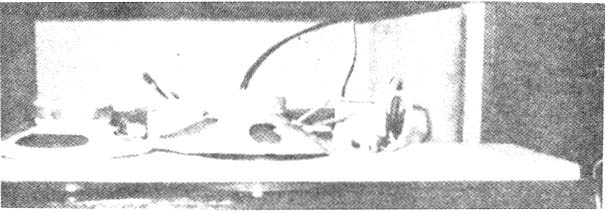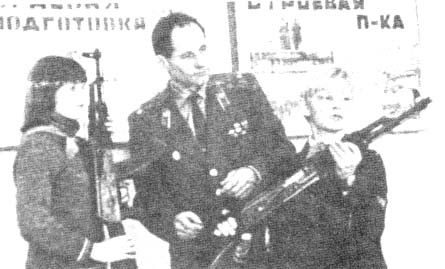Editor of this issue: Jonas Zdanys
Copyright © 1984 LITUANUS Foundation, Inc.

|
LITUANUS
LITHUANIAN QUARTERLY JOURNAL OF ARTS AND SCIENCES
Volume 30, No.4 - Winter 1984
Editor of this issue: Jonas Zdanys ISSN 0024-5089
Copyright © 1984 LITUANUS Foundation, Inc. |

|
LITUANUS DATA BANK
A. V. DUNDZILA
• It is a well known fact that the state-run media in the Soviet Union gave the 1984 Olympics minimal coverage. The August 14, 1984 edition of the Chicago Tribune noted an interesting fact, that the travelers returning from Tallinn, the Estonian capital just 50 miles across the Baltic Sea from Finland, reported heavier-than-usual hotel bookings in that small republic for the last two weeks, apparently because the Olympics could be viewed there on Finnish television . . .
• A major document of Lithuanian underground literature has found its way across the Iron Curtain. The voluminous memoirs of the late Juozas Keliuotis (1902-1983), an important Lithuanian writer, critic, and editor, have been received in the West and will be published in several languages.
After the Soviet reoccupation of Lithuania, Mr. Keliuotis was arrested by the NKVD in 1945 and sent to the Gulag camps. Among other accounts, his journey to the place of imprisonment was horrifying. When the cattle cars with prisoners arrived at the destination near the Arctic Ocean, Mr. Keliuotis was frozen to the boards and unable to rise. The guards tore the prisoners off the boards and threw them on a snow bank outside. Other experiences of intellectuals under totalitarian rule are given in graphic detail.
• The nature of "systematic discontent" in the three Baltic republics is the subject of a new study by Alexander R. Alexiev, "Dissent and Nationalism in the Soviet Baltic". It was published in September of 1983 by the Rand Corporation as part of the study, "Soviet Vulnerabilities in Eastern Europe". The study examines the evolution of Baltic dissent and nationalism in the 1970's and early 1980's. The author identifies three major types of policies as contributing to Baltic alienation and discontent. First, the Soviet control is viewed as a Russian-dominated, quasi-colonialist system. Second, an economic exploitation is strongly suspected. Lastly, many are convinced that the Soviet regime is pursuing denationalization.
• The 62nd issue of the underground Chronicle of the Catholic Church in Lithuania was received in the West recently. It is dated April 4, 1984 and contains an extensive report on the Communist efforts to curtail the festive commemoration of the 500th anniversary of the death of St. Casimir, the patron saint of Lithuania. Numerous cases of discrimination against Lithuanian Catholics are surveyed.
• Dr. Bronius Vaðkelis has been appointed to the first Distinguished Professorship of Lithuanian Studies at the University of Illinois at Chicago, effective September, 1984. LITUANUS is pleased to note Dr. Vaðkelis' ties with this journal which span the last two decades and include his tenure as an editor.
• A Baltic Studies Center has been organized at the University of Wisconsin-Madison to develop library and microfilm resources, and to support research, lecture, and publication activities in the general area of Baltic studies. Participating scholars include both Baits and non-Baits from fields as diverse as Spanish and Political Science. The Center as yet has no instructional program and no funding of its own; its immediate aim is to build up the university's collection of Baltic research materials to create a base for the eventual introduction of Baltic courses within one or another existing department. Linguist Valdis Zeps is coordinator for this year.
• An Australian visitor was recently expelled from Soviet-occupied Latvia, after he discovered a listening device in his hotel room. The Australian, who has asked us not to publish his name, was on a conducted tour of the Baltic States, arranged by a Sidney travel agency.

Photo courtesy of Laiks.
On arrival in Riga, capital of Soviet-occupied Latvia, the Australian tourist was accommodated in Hotel Latvija. Having previously read about bugging devices, he checked his room and found an unusually large number of wires coming out of the radio. He unscrewed the "radio" from its mountings, but was unable to put it back into place.
On the following morning, Soviet authorities told the Australian guest that his holiday was cancelled and put him on the next plane to Australia. No reason was given for the expulsion, and the balance of tour money was not refunded.
Local Latvians joke that Soviet hotels for foreigners are built of 60% glass, 30% reinforced concrete and 10% microphones.
• During the last few years, a new bizarre twist in Soviet policy has been implemented by the Kremlin. Young Latvian, Estonian, and Lithuanian children are being conscripted into the Soviet army for training. As early as 1967, Brezhnev introduced military training for children at the 10th grade level. In 1982, the program was extended to students in the upper grades. Since Brezhnev's death, the training has intensified and has been integrated into the regular school curriculum.
Baltic children from the ages 11 to 14 are required to participate in the training maneuvers called Kavi (Northern Lights). Children over 14 are required to participate in operation Erg/em (Egret).
The "young-soldier maneuvers," as they are called, are held three times a year. Between maneuvers, children undergo weekly training in basic military skills including disassembly and assembly of automatic weapons.
As the Soviet Union is conducting a massive and hypocritical peace campaign, the Baltic people are subjected to terror and merciless Russification. And against all international rules of conduct by occupation forces in an occupied country, the Soviets are conscripting Lithuanian, Estonian and Latvian children for cannon fodders in future Soviet aggression and adventurism.

Photo courtesy of WFFL
Latvian school children undergoing military training by Soviet occupation forces.